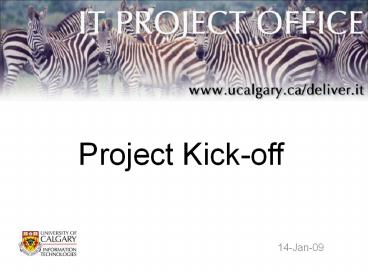Project Kick-off - PowerPoint PPT Presentation
Title:
Project Kick-off
Description:
Project Kick-off 14-Jan-09 Purpose of the Project Kick-off The project kick-off meeting is the first opportunity a Project Manager has to energize the project team ... – PowerPoint PPT presentation
Number of Views:1475
Avg rating:3.0/5.0
Title: Project Kick-off
1
Project Kick-off
- 14-Jan-09
2
Purpose of the Project Kick-off
- The project kick-off meeting is the first
opportunity a Project Manager has to energize the
project team and establish a common purpose
toward completing the work. - An effective kick-off meeting will ensure that
all project team members have an understanding of - the project objectives
- scope and constraints
- each team members' role and responsibility in the
project - the high level work plan (deliverables and
milestones) - how to track their time on the project
- where project documentation will be located
- The goal is to get everyone up to speed but not
to discuss every item in detail.
3
Project Kick-off Pre-Requisites
- The project charter is finalized and signed off.
- A sufficient budget has been allocated to the
project (for the next phase or for the entire
project). - The project is approved to proceed by the
sponsor. - A project manager / project lead is assigned.
- The tasks/activities are defined at a high level
and resource requirements have been estimated. - Required resources have been formally assigned to
the project and have confirmed attendance at the
kick-off meeting.
4
Project Kick-off Preparation
- Determine the meeting time and place.
- Create the meeting agenda and distribute it in
the meeting invite along with any project
documents the team should review prior to the
meeting. - Create the project presentation using key points
from the charter and other project documentation.
- Create a team contact list.
- Create a project repository, e.g. a project
sharepoint site. - Create the project in PM2 for time tracking.
5
At the Kick-off Meeting
- Review the project presentation with the team.
- Pay close attention to the questions being asked.
Some issues may be identified that require
follow up (do you have the right people, are you
missing representation from an area, are there
important details that have not been identified). - If possible, have the sponsor attend the meeting
and provide details on the importance of the
project to the University. - Review the project framework (ITDDM) to ensure
the team understands were the project is at and
how it will progress. - Provide the project code / name in PM2 and the
link to the project repository. - Determine how often the team will meet and
determine the best day/time of the week to
schedule the meetings.
6
After the Meeting
- Document the meeting minutes and save them in the
project repository. - Distribute the link to the project repository,
identifying the location of the minutes. - Schedule the team meetings.
- Follow up on the items identified at the kick-off
meeting. - Begin project execution.
7
What if . . .
- . . . I dont know who my sponsor is?
- . . . I dont have a charter but have been
directed to start the project? - . . . the project budget has not been estimated,
therefore is not formally approved? - . . . I dont know for sure what resources are
required for my project? - . . . I am missing key resources but must start
the project without them? - . . . I am not familiar enough with the project
framework (ITDDM) to review it with my team?
8
The PMBOK
- Project Management Body of Knowledge
- sum of knowledge within the profession of project
management - used to document and standardize generally
accepted project management information and
practices - produced by the Project Management Institute
- revised and reprinted every 4 years fourth
edition has just been released
9
PM Knowledge Areas Process Groups
PM Process Groups / Knowledge Area Processes Initiating Process Group Planning Process Group Executing Process Group Monitoring Controlling Process Group Closing Process Group
Project Management Integration Develop Project Charter Develop Prelim Project Scope Statement Develop Project Management Plan Direct and Manage Project Execution Monitor and Control Project Work Integrated Change Control Close Project
Project Scope Management Scope Planning Scope Definition Create WBS Scope Verification Scope Control
Project Time Management Activity Definition Sequencing Resource Estimating Duration Estimating Schedule Development Schedule Control
Project Cost Management Cost Estimating Cost Budgeting Cost Control
Project Quality Management Quality Planning Perform Quality Assurance Perform Quality Control
Project HR Management Human Resources Planning Acquire Project Team Develop Project Team Manage Project Team
Project Communications Management Communications Planning Information Distribution Performance Reporting Manage Stakeholders
Project Risk Management Risk Management Planning Risk Identification Qualitative / Quantitative Risk Analysis Risk Response Planning Risk Monitoring and Control
Project Procurement Management Plan Purchases and Acquisitions Plan Contracting Request Seller Responses Select Sellers Contract Administration Contract Closure
10
In conclusion . . .
- . . . follow process and progress will follow.
11
Questions?
Contact us at deliver.it_at_ucalgary.ca or
210-8792 Visit our web-site at www.ucalgary.ca/de
liver.it
Next PMCP Outcome Plans Wed, Feb 11, 2009
Thank you for coming!
12
The end.































